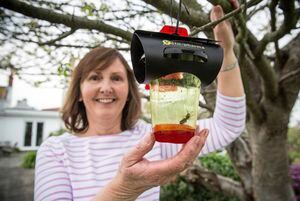Public’s help ‘vital’ as two Asian hornet queens caught
TWO ASIAN hornet queens have been caught in the Bailiwick – the first of 2019.

The invasive species was first spotted in Guernsey in 2017 and eight nests were found and destroyed last year.
Agriculture, Countryside & Land Management Services instigated a major project last month to trap Asian hornet queens as they emerged from hibernation or arrived in the island from further afield.
A total of 275 baited traps were spaced about 500 metres apart across Guernsey and have been regularly checked by volunteers.
Similar trapping schemes have been rolled out in Herm, Sark, Alderney, Jethou and Brecqhou.
The first queen was found in a trap in a residential property on La Mazotte, near L’Ancresse common, last Thursday. A queen has also been found in one of the 23 traps in Sark.
Asian Hornet Strategy project co-ordinator Francis Russell said none of the nests found last year was in the area the latest hornet was caught.
‘There was a sighting in the north of the island last year, but we never found a nest,’ he said.
‘However, I think this hornet came from France. There were easterly winds over the weekend and it’s a short hop from France.’
There are eight traps on Herm, as well as two each on Jethou and Brecqhou.
Asian hornets are a threat to local wildlife, in particular honey bees. Nests can hold up to 5,000 hornets, which also present a risk to the public.
At this time of year the queens are often alone before establishing a nest, making them easier to capture.
Last year the programme saw 55 queens captured in Alderney. This helped reduce the number of nests that were established there. Just four nests were found in Alderney last year. The northern island is just eight miles from France. Asian hornets were first seen in France in 2004 and have now spread across the country.
Mr Russell said the public’s help was vital in tackling the problem in Guernsey.
‘We cannot emphasise enough the important role played by members of the public in reporting potential Asian hornet sightings or looking out for small nests made by the queens at this time of year,’ he said.
‘Our aim is to ensure that we can keep the populations of Asian hornet as low as possible, to protect public health and the island’s biodiversity, and we remain especially grateful for the assistance of the volunteers involved with the spring queening project.’
The traps will stay up until the end of May, by which time any queens will have started making nests. After that other tracking methods will be used.
Unfortunately, the traps also attract other wildlife, in particular wasps.
Mr Russell said he had set up 20 traps to see how much wildlife was caught and the Guernsey Beekeeping Association also has 13 traps.
The results will be analysed later in the year to see what impact the trapping has on local insects and that impact then weighed against the harm caused by Asian hornets, when deciding whether to continue the programme.
Anyone who thinks they have seen an Asian hornet or found an Asian hornet nest can report it to Agriculture, Countryside and Land Management Services by emailing asianhornet@gov.gg.





